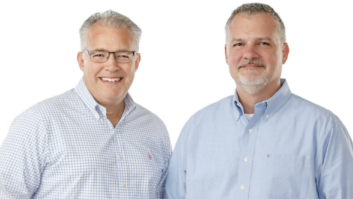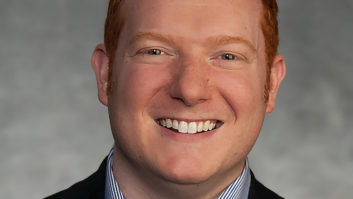Few people are watching XM Satellite Radio and Sirius as closely as Noah A. Samara.
“We literally founded this industry,” the chairman and CEO of WorldSpace said during a recent visit I made to the company’s headquarters on N Street in northwest Washington.
Right now, virtually all U.S. media stories about satellite radio focus on XM and Sirius. But WorldSpace, which the Ethiopian-born Samara founded in 1990 at age 34 and which began satellite audio services in 1999, seems to be at a critical point in its own growth.
Samara is majority owner of WorldSpace, which is backed by private venture capital. His initial money came from Saudi investors. Forbes reported in 2002 that those backers had grown restless, with one trying oust Samara; instead, it stated, he wound up taking over most of the company and continued to seek the path to profitability. Those efforts apparently continue.
The company has approximately 300 employees, 80 or so in Washington. It broadcasts an MP3-encoded signal on the L Band in approximately 100 dialects and languages via its AfriStar and AsiaStar satellites.
Here’s what’s happening at WorldSpace, based on what Samara and two other company officials told me during interviews last year and in January:
Subscriptions: The company is moving its business model to subs and would like to be 75 to 80 percent paid. At one time, the service was free to most buyers of receivers; the firm sought revenue by leasing its capacity and selling a combination of ads, receivers and some subs. “But by 2000, clearly the model was suffering,” Samara said. “The fastest route to profitability was subscriptions.”
Starting down that road, it plans paid services in four targeted areas: India, China, southern Africa and the Middle East. Eventually it hopes to add Europe.
In India, WorldSpace sees a population with a critical mass of consumers with middle- to upper-middle class incomes, an appetite for music and information but few terrestrial channels. The company has 20,000 subscribers to a new paid service there; it has conducted a “soft launch” in Bangalore and Bombay, and is eyeing New Delhi next.
According to Ted Kelly, vice president of international marketing and communications, the content includes four India-specific channels; WorldSpace’s own programming as well as material from content providers such as NPR; and programming for English-speaking “ex-pats” from the United States and United Kingdom.
The service is being offered for an introductory $3 per month; it will increase eventually to about $5. A small part of the service will remain free as what Samara called a barker channel.
After India comes China, where WorldSpace is starting with a subscription stock quote service.
Samara said consumer statistics show a potentially massive market with disposable income: 14 million cable users in India, 80 million in China. “Morocco … has 5 million cell phones. I can literally break even in Morocco alone,” he said.
Thus WorldSpace, conceived as a business built on serving information have-nots, now is banking on what one official called the “relatively economically advantaged” classes.
Ex-Pats: Within two to three years, WorldSpace hopes to have 2 to 3 million subscribers; and it thinks perhaps 15 percent of those will be to Home Team Radio.
A new and vital part of its strategy is to attract ex-patriots and military personnel, English speakers from the United States and the United Kingdom posted abroad. The company thinks there might be 6 million of them within its footprint. Home Team Radio is a premium service for these listeners. Its slogan: “Imagine your favorite stations, wherever you’re stationed.”
Listeners will be able to hear NPR, Virgin Radio UK, Bloomberg, Radio Caroline and a package of music channels that includes American and U.K. hits. Kelly said WorldSpace will add more American news and sports services shortly.
“The more remote people are from their national/cultural background, the more they need to stay connected,” said Chief Operating Officer Andy Ras-Work. “People are saying to us and NPR how great it is to hear NPR in different parts of the world.” Kelly said WorldSpace also received a strong emotional response from listeners abroad after the terror attacks in 2001.
Mobile: WorldSpace will ramp up efforts to penetrate the mobile market.
“The XM experience is telling us quite a lot about the number of repeaters (required),” Samara said. He said both XM and WorldSpace had “grossly overestimated” the number of terrestrial repeaters each service would need to reach moving listeners in urban areas. The satellites, he said, are powerful; reaching listeners won’t cost as much as expected.
“Once we go mobile, the market is huge,” Samara said. “The number of cars far outstrips the ability of governments to accommodate them. That’s a lot of downtowns – not just Cairo or Mexico City, but (cities like) Addis Ababa.”
The company has conducted tests of its European Mobile service in Paris, planned for 2006. It plans alliances with receiver manufacturers to allow telematics and other services such as GPS, weather and traffic.
Meanwhile, it will begin promoting car radios with small antennas in India later this year.
The Lessons of XM: The experience of the U.S. satellite companies, particularly XM, has been useful. “Having helped birth XM, you’d think we’d be the big brother,” Samara said. “But XM is teaching us so much.”
WorldSpace and XM had been partners until the 1998 U.S. bombing of a pharmaceutical factory in Sudan, carried out in retaliation for terrorist attacks on U.S. embassies in Kenya and Tanzania.
According to news reports at the time, the owner of the factory was an investor in WorldSpace. He denied any connection to the assaults and won the release of U.S.-based assets that had been frozen by the U.S. government; but some XM principals, Newsbytes News Network reported, “feared the controversy about the attack could delay or endanger regulatory approvals for their project. … To head off such complications, WorldSpace sold its interest in XM Satellite Radio” to XM’s parent company.
The companies retain ties. WorldSpace has licensed technology to XM, they share programming resources and WorldSpace is an XM strategic partner.
“It’s wonderful to see that the satellite radio model WorldSpace created has proven successful,” Kelly said.
Ras-Work said XM is validating the WorldSpace concept, overcoming skepticism that people will people would pay for radio.
“Being able to see XM overcome that, including the fact that 10 percent of XM’s original content music programming comes from WorldSpace … That same sort of enthusiasm is something we’re leveraging in different parts of the world.”
The American experience also supports the affluent early-adopter model, said Kelly. Planners had expected early adopters to trend young and tech-savvy, but in reality the real adopters are those who can afford the receiver, and thus are “a little older.”
So how will this all play out?
The numbers seem to be on Samara’s side. WorldSpace has assets: a substantial infrastructure, a large international footprint, what it calls “fantastic” propagation characteristics and an almost priceless piece of spectrum. Its potential market is huge.
“To be highly profitable, I need 20 million (subscribers) at $5 a month,” Samara said. “I could do that in just one country.”
Still, as the past has shown, WorldSpace faces many challenges: a slow uptake, changing revenue models, substantial capital costs, limited lifespans of the satellites themselves and unpredictable political considerations.
The company has spent $1.4 billion. Samara has said he needs 2 million to 2.5 million subscribers in 2005 to break even and won’t say how many he has now. The company estimates the number of receivers sold at 300,000, so it seems to safe to say the current subscriber list is less than that. (At one time he had hoped for 1 million receivers sold by 2001, according to Forbes.)
The company has been seeking more backing. “We have funded about 90 percent of what we need to get to profitability,” Samara said in 2003, “and will be raising additional money to find and fund content and subscribers.” The company also has developed a sales unit aimed at pitching itself as a solution to communication needs for governments.
The launch of a third satellite to cover Latin America has been delayed indefinitely – for “macroeconomic reasons,” according to Ras-Work, although some reports have blamed a battle with the U.S. military and Boeing over use of the L Band. Ras-Work said that the satellite could be used instead for service in Europe. A fourth, spare bird is in construction.
Samara is nothing if not an upbeat salesman for his conception.
“We cover around 5 billion people, the largest footprint of any satellite company in the world. It’s almost a perfect fit for the post-9/11 business plan. We cover all of the hot spots.”
Whether it all works will depend on content. And where have we heard that before?
As Ras-Work told me, “If you have great content that people will want to listen to and be entertained by, you have a chance to make a significant business out of it.”
Deep pockets also help.












